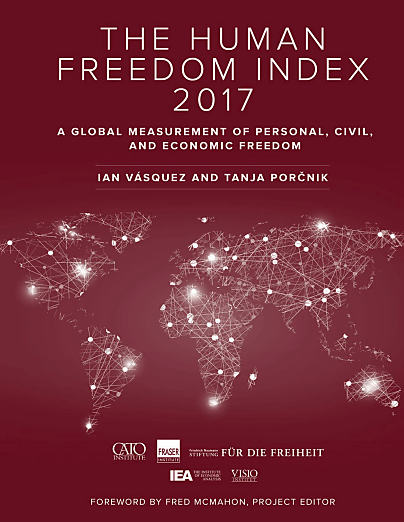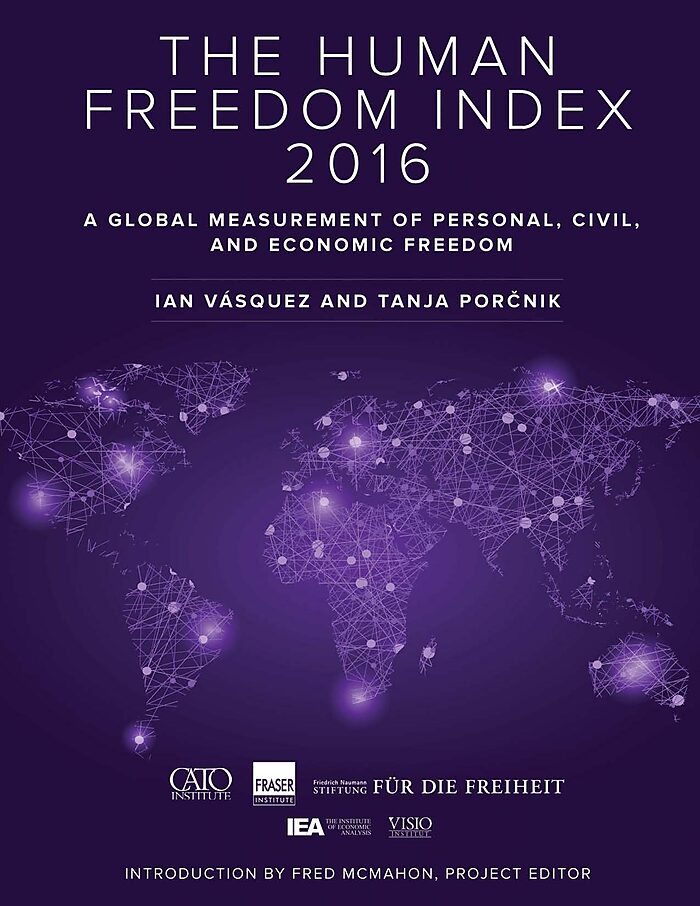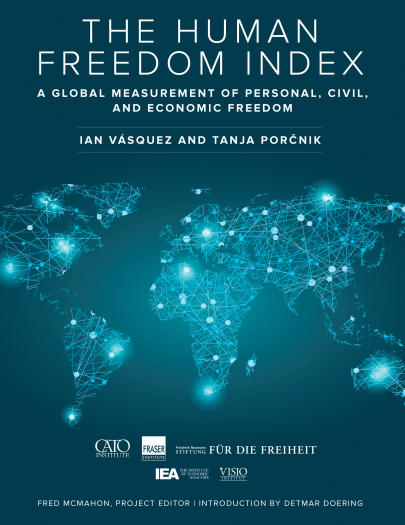The Human Freedom Index presents the state of human freedom in the world based on a broad measure that encompasses personal, civil, and economic freedom. Human freedom is a social concept that recognizes the dignity of individuals and is defined here as negative liberty or the absence of coercive constraint. Because freedom is inherently valuable and plays a role in human progress, it is worth measuring carefully. The Human Freedom Index is a resource that can help to more objectively observe relationships between freedom and other social and economic phenomena, as well as the ways in which the various dimensions of freedom interact with one another.
The report is co-published by the Cato Institute, the Fraser Institute, and the Liberales Institut at the Friedrich Naumann Foundation for Freedom.
The Human Freedom Index - 2019
 By Ian Vásquez and Tanja Porcnik Full Report PDF |
The index published here presents a broad measure of human freedom, understood as the absence of coercive constraint. This fifth annual index uses 76 distinct indicators of personal and economic freedom in the following areas:
The HFI is the most comprehensive freedom index so far created for a globally meaningful set of countries. The HFI covers 162 countries for 2017, the most recent year for which sufficient data are available. The index ranks countries beginning in 2008, the earliest year for which a robust enough index could be produced. On a scale of 0 to 10, where 10 represents more freedom, the average human freedom rating for 162 countries in 2017 was 6.89. Among countries included in this year’s and last year’s report, the level of freedom decreased slightly (−0.01) compared with 2016, with 70 countries increasing their ratings and 88 decreasing. Since 2008, the level of global freedom has also decreased slightly (−0.07), with 61 countries in the index increasing their ratings and 79 decreasing. The jurisdictions that took the top 10 places, in order, were New Zealand, Switzerland, Hong Kong, Canada, Australia, Denmark and Luxembourg (tied in 6th place), Finland and Germany (tied in 8th place), and Ireland. Selected countries rank as follows: Sweden (11), United Kingdom (14), United States (15), Taiwan (19), Japan (25), South Korea (27), Chile (28), France (33), South Africa (64), Argentina (77), Mexico (92), India (94), Brazil (109), Russia (114), Turkey (122), China (126), Saudi Arabia (149), Iran (154), Egypt (157), Venezuela (161), and Syria (162). Out of 10 regions, the highest levels of freedom are in North America (Canada and the United States), Western Europe, and East Asia. The lowest levels are in the Middle East and North Africa, sub-Saharan Africa, and South Asia. Women-specific freedoms, as measured by five indicators in the index, are strongest in North America, Western Europe, and East Asia and are least protected in the Middle East and North Africa, sub-Saharan Africa, and South Asia. Countries in the top quartile of freedom enjoy a significantly higher average per capita income ($40,171) than those in other quartiles; the average per capita income in the least-free quartile is $15,721. The HFI also finds a strong relationship between human freedom and democracy. Hong Kong is an outlier in this regard. The findings in the HFI suggest that freedom plays an important role in human well-being, and they offer opportunities for further research into the complex ways in which freedom influences, and can be influenced by, political regimes, economic development, and the whole range of indicators of human well-being. Read the whole publication PDFCountry Profiles PDFData: CSV | DTA | JSON | XLSX |
The Human Freedom Index - 2018
 By Ian Vásquez and Tanja Porcnik Full Report PDF |
The index published here presents a broad measure of human freedom, understood as the absence of coercive constraint. It uses 79 distinct indicators of personal and economic freedom in the following areas:
The HFI is the most comprehensive freedom index so far created for a globally meaningful set of countries. The HFI covers 162 countries for 2016, the most recent year for which sufficient data are available and it includes three countries—Belarus, Iraq, and Sudan—that were added this year. The index ranks countries beginning in 2008, the earliest year for which a robust enough index could be produced. On a scale of 0 to 10, where 10 represents more freedom, the average human freedom rating for 162 countries in 2016 was 6.89. Among countries included in this year’s and last year’s report, the level of freedom decreased slightly (−0.01) compared with 2015, with 63 countries increasing their ratings and 87 decreasing. Since 2008, the level of global freedom has also decreased slightly (−0.06), with 56 countries in the index increasing their ratings and 81 decreasing. The jurisdictions that took the top 10 places, in order, were New Zealand, Switzerland, Hong Kong, Australia, Canada, the Netherlands and Denmark (tied in 6th place), Ireland and the United Kingdom (tied in 8th place), and Finland, Norway, and Taiwan (tied in 10th place). Selected countries rank as follows: Germany (13), the United States and Sweden (17), Republic of Korea (27), Japan (31), France and Chile (32), Italy (34), South Africa (63), Mexico (75), Kenya (82), Indonesia (85), Argentina and Turkey (tied in 107th place), India and Malaysia (tied in 110th place), United Arab Emirates (117), Russia (119), Nigeria (132), China (135), Pakistan (140), Zimbabwe (143), Saudi Arabia (146), Iran (153), Egypt (156), Iraq (159), Venezuela (161), and Syria (162). Out of 10 regions, the highest levels of freedom are in North America (Canada and the United States), Western Europe, and Oceania. The lowest levels are in the Middle East and North Africa, sub-Saharan Africa, and South Asia. Women-specific freedoms, as measured by seven indicators in the index, are strongest in North America, Western Europe, and Eastern Europe and are least protected in the Middle East and North Africa, sub-Saharan Africa, and South Asia. Countries in the top quartile of freedom enjoy a significantly higher average per capita income ($39,249) than those in other quartiles; the average per capita income in the least-free quartile is $12,026. The HFI also finds a strong relationship between human freedom and democracy. Hong Kong is an outlier in this regard. The findings in the HFI suggest that freedom plays an important role in human well-being, and they offer opportunities for further research into the complex ways in which freedom influences, and can be influenced by, political regimes, economic development, and the whole range of indicators of human well-being. Read the whole publication PDFCountry Profiles PDFData: CSV | DTA | JSON | XLSX |
The Human Freedom Index - 2017
 By Ian Vásquez and Tanja Porcnik Full Report PDF |
The index published here presents a broad measure of human freedom, understood as the absence of coercive constraint. It uses 79 distinct indicators of personal and economic freedom in the following areas:
The HFI is the most comprehensive freedom index so far created for a globally meaningful set of countries. The HFI covers 159 countries for 2015, the most recent year for which sufficient data are available. The index ranks countries beginning in 2008, the earliest year for which a robust enough index could be produced. On a scale of 0 to 10, where 10 represents more freedom, the average human freedom rating for 159 countries in 2015 was 6.93. Among countries included in this report, the level of freedom decreased slightly (-0.05) compared with 2014, with 61 countries increasing their ratings and 97 decreasing. Since 2008, the level of global freedom has also decreased slightly (-0.12), with about half of the countries in the index increasing their ratings and half decreasing. The top 10 jurisdictions in order were Switzerland, Hong Kong, New Zealand, Ireland, Australia, Finland, Norway, Denmark, and, tied at 9th place, the Netherlands, and the United Kingdom. Selected countries rank as follows: Canada (11), Sweden (13), Germany (16), the United States (17), Japan (27), South Korea (29), France (33), Italy (35), Chile (37), South Africa (68), Mexico (73), Indonesia (78), Turkey (84), Kenya (89), Malaysia (97), India (102), United Arab Emirates (116), Russia (126), China (130), Nigeria (133), Pakistan (141), Zimbabwe (146), Saudi Arabia (149), Iran (154), Egypt (155), Venezuela (158), and Syria (159). Out of 17 regions, the highest levels of freedom are in Western Europe, Northern Europe, and North America (Canada and the United States). The lowest levels are in the Middle East and North Africa, Eastern Europe (Moldova, Russia, and Ukraine), South Asia, and sub-Saharan Africa. Women-specific freedoms, as measured by seven indicators in the index, are strongest in five European regions (Central Europe and the Baltics, Western Europe, Northern Europe, Eastern Europe and Southern Europe) and North America and are least protected in the Middle East and North Africa, South Asia, and sub-Saharan Africa. Countries in the top quartile of freedom enjoy a significantly higher per capita income ($38,871) than those in other quartiles; the per capita income in the least-free quartile is $10,346. The HFI finds a strong correlation between human freedom and democracy. Hong Kong is an outlier in this regard. The findings in the HFI suggest that freedom plays an important role in human well-being, and they offer opportunities for further research into the complex ways in which freedom influences, and can be influenced by, political regimes, economic development, and the whole range of indicators of human well-being. Read the whole publication PDFCountry Profiles PDFDownload the data XLSX |
The Human Freedom Index - 2016
 By Ian Vásquez and Tanja Porcnik |
The index published here presents a broad measure of human freedom, understood as the absence of coercive constraint. It uses 79 distinct indicators of personal and economic freedom in the following areas:
The Human Freedom Index (HFI) is the most comprehensive freedom index so far created for a globally meaningful set of countries. The HFI covers 159 countries for 2014, the most recent year for which sufficient data are available. The index ranks countries beginning in 2008, the earliest year for which a robust enough index could be produced. On a scale of 0 to 10, where 10 represents more freedom, the non-weighted average rating for 159 countries in 2014 was 6.93. The level of global freedom stayed about the same compared to 2008, but almost all countries experienced changes in their ratings, with about half of those increasing their ratings and half decreasing. The top 10 jurisdictions in order were Hong Kong, Switzerland, New Zealand, Ireland, Denmark, Australia (6), Canada (6), the United Kingdom (6), Finland (9), and the Netherlands (10). The United States is ranked in 23rd place. Other countries rank as follows: Germany (13), Chile (29), France (31), Japan (32), Singapore (40), South Africa (74), Brazil (82), India (87), Russia (115), Nigeria (140), China (141), Saudi Arabia (144), Zimbabwe (148), Venezuela (154), and Iran (157). Out of 17 regions, the highest levels of freedom are in Western Europe, Northern Europe, and North America (Canada and the United States). The lowest levels are in the Middle East and North Africa, South Asia, and sub-Saharan Africa. Women’s freedoms, as measured by seven relevant indicators in the index, are strongest or least repressed in Europe and North America and least protected in the Middle East and North Africa, South Asia, and sub-Saharan Africa. Countries in the top quartile of freedom enjoy a significantly higher per capita income ($37,147) than those in other quartiles; the per capita income in the least-free quartile is $8,700. The HFI finds a strong correlation between human freedom and democracy. Hong Kong is an outlier in this regard. The findings in the HFI suggest that freedom plays an important role in human well-being, and they offer opportunities for further research into the complex ways in which freedom influences, and can be influenced by, political regimes, economic development, and the whole range of indicators of human well-being. Read the whole publication PDFCountry Profiles PDF |
The Human Freedom Index - 2015
 By Ian Vásquez and Tanja Porcnik |
The index published here presents a broad measure of human freedom, understood as the absence of coercive constraint. It uses 76 distinct indicators of personal and economic freedom in the following areas:
The Human Freedom Index (HFI) is the most comprehensive freedom index so far created for a globally meaningful set of countries. The HFI covers 152 countries for 2012, the most recent year for which sufficient data is available. The index ranks countries beginning in 2008, the earliest year for which a robust enough index could be produced. This preliminary report was updated (using data for 2013) and will be subsequently presented and updated on a yearly basis. On a scale of 0 to 10, where 10 represents more freedom, the nonweighted average rating for 152 countries in 2012 was 6.96. The level of global freedom stayed about the same compared to 2008, but almost all countries experienced changes in their ratings, with about half of those increasing their ratings and half decreasing. The top 10 jurisdictions in order were Hong Kong, Switzerland, Finland, Denmark, New Zealand, Canada, Australia, Ireland, the United Kingdom, and Sweden. The United States is ranked in 20th place. Other countries rank as follows: Germany (12), Chile (18), Japan (28), France (33), Singapore (43), South Africa (70), India (75), Brazil (82), Russia (111), China (132), Nigeria (139), Saudi Arabia (141), Venezuela (144), Zimbabwe (149), and Iran (152). Out of 17 regions, the highest levels of freedom are in Northern Europe, North America (Canada and the United States), and Western Europe. The lowest levels are in the Middle East and North Africa, Sub-Saharan Africa, and South Asia. Women’s freedoms, as measured by five relevant indicators in the index, are most protected in Europe and North America and least protected in South Asia, Sub-Saharan Africa, and the Middle East and North Africa. Countries in the top quartile of freedom enjoy a significantly higher per capita income ($30,006) than those in other quartiles; the per capita income in the least-free quartile is $2,615. The HFI finds a strong correlation between human freedom and democracy. Hong Kong is an outlier in this regard. The findings in the HFI suggest that freedom plays an important role in human well-being, and they offer opportunities for further research into the complex ways in which freedom influences, and can be influenced by, political regimes, economic development, and the whole range of indicators of human well-being. Read the whole publication PDFPurchase |